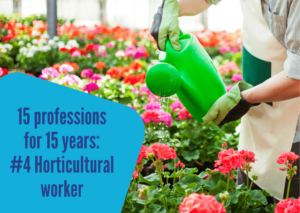The horticultural seasonal worker: helping Belgian agriculture reach their renowned high quality
This year, Link2Europe celebrates its 15th anniversary, and to continue the party, we are taking a look at all the different profiles we have had the chance to recruit.
Seasons come and go and so does the extra work related to those seasons. Periods of intense labor to keep up with nature are followed by calm months when nature is dormant. For over 15 years, Link2Europe has been the trusted partner for providing strong candidates to fill in the gaps during the high-demand seasons. And we do so by looking for and supporting foreign talent.
To mark our anniversary, we put the top 15 of the highest demanded profiles in the spotlight and today, we shine a light on the horticultural seasonal worker.
The harvest card: your way to earn some extra money
Belgium is one of the largest European exporters of trees, plants, and flowers, with Flanders being the main production region (approximately 90%). Belgian exporters are known across borders for their high-quality ornamental plants, but they also guarantee great personal service, excellent professional skill, and enormous flexibility. The companies are often still family-run, where the second or third generation is currently at the wheel. This makes for a company that is very proud of the product they deliver and to keep up with the high standards in quality, many seasonal workers are needed to support the regular team.
With spring in the air and the first buds and leaves already appearing on the trees, the season of the harvest is soon upon us. Before young cabbage, potatoes, and fresh strawberries are found in stores, they need to make their way from the greenhouse or field onto transport. And to meet the high demands during the peak season, Belgium introduced the harvest card (plukkaart), an easy way to earn some extra money. One day before, the employer draws up a day contract and over a long period of time with day contracts, the harvest card gives you a quick overview of hours spend working as a horticultural seasonal worker. That way, the harvest card acts as a confirmation of the hours worked on your daily contracts.
You will receive your first harvest card from us before your first working day as a seasonal worker. If you start working for another employer, you take your card with you. That way, you have a clear picture of how many days you work as a seasonal worker each year, and many allotted days you have left.
Silhouette: horticultural seasonal worker
The corona crisis resulted in an increase in the days you can work as a seasonal worker in agriculture and horticulture in 2022. For example, in agriculture 30 went to 60 days and in horticulture 65 turned into 100 days. The different production sectors are floriculture, arboriculture, forest tree nursery, fruit growing, vegetable growing (both glasshouse and open-air), chicory growing, and mushroom growing.
A day in the life of a horticultural seasonal worker
You will spend most of your time outside or in a greenhouse, which means good physical health and shape will help you thrive. You don’t mind getting dirty since your hands and feet will most likely be covered in soil all day. A day in your life is dictated by the weather, meaning on good days, you may work up to 11 hours per day and 50 hours per week, including Saturdays. If the weather is bad, your day could be cut short or moved indoors to prepare fruits, plants, trees, and vegetables for transport.
As an agency worker, you get your salary every week. In the middle of the second work week, you get the salary for the first week and so on.
Your income and the most common benefits:
- Salary range on average of 9,69 – 13,57 euros per hour
- Travel expenses
- End of year bonus if you worked more than 50 days
- A loyalty premium of 0.50 euros per day worked if you worked more than 30 days for the same employer
What makes a good horticultural worker?
- EU nationality
- Communicative level of English (knowledge of Dutch or French is a plus).
- Willingness to work up to 50 hours a week
- We value previous experience in harvesting
Ready, set….work!
During the last 15 years, Link2Europe helped and supported many horticultural seasonal workers from abroad and will continue to do so long into the future since working in Belgian horticulture with a harvest card is a great way to increase your income. The salaries paid in this sector tend to be higher in Belgium than in other European countries.
So, are you ready to get dirty? Kidding…but do get ready for a day of physical labor with a handsome payout at the end. You can rely on Link2Europe to be your trusted partner!
Exited, motivated, good to go? Send us your CV today!




